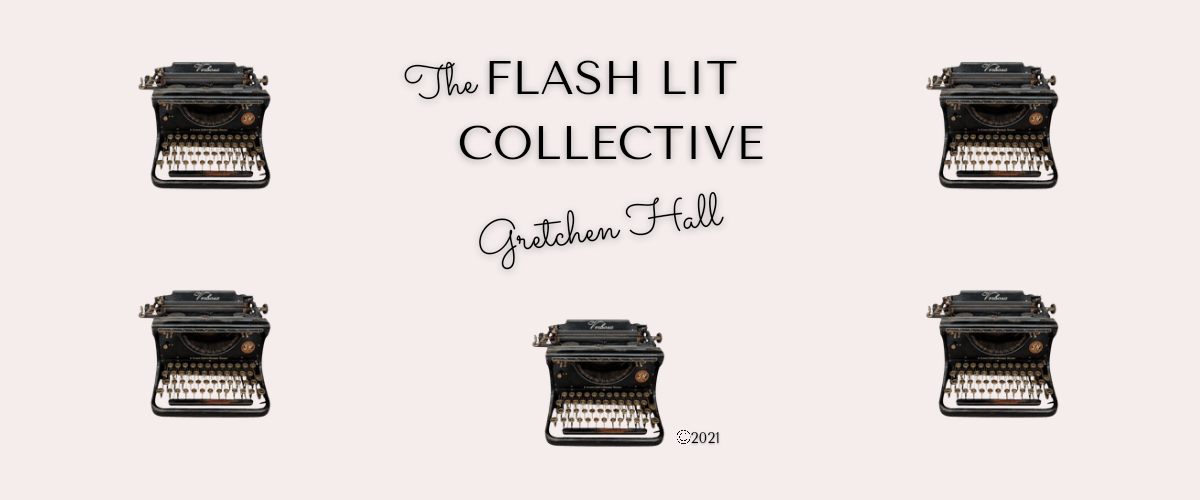Gretchen Hall is a lawyer based in San Francisco. She enjoys spinning, reading, and exploring new creative pursuits. This is her first creative writing project since high school, and says that if you wanted to call it a little bit of a mid-life crisis, you wouldn’t be totally wrong. Although new to To Live & Write … Wherever You Are and The Flash Lit Collective, Gretchen’s work has made a strong impression in our community of writers and she is a very welcome addition to the group.
June 2021 | Flash Lit Collective | Prompt #1
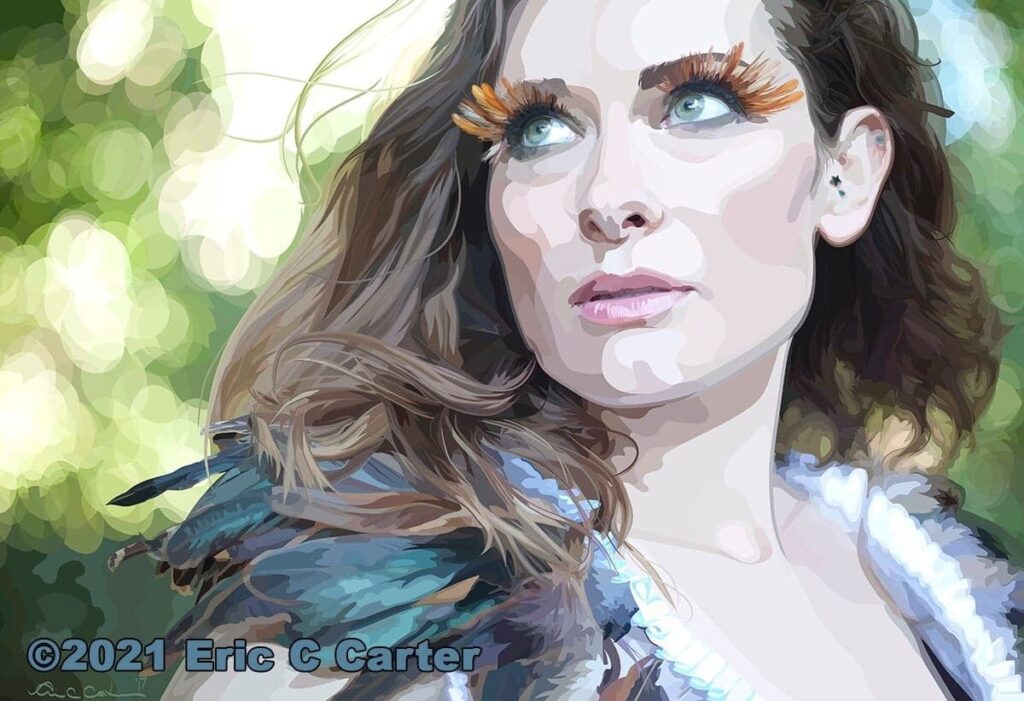
Image credit: Eric C Carter @dizzypixel. Photograph + illustration by hand; no filters. Like his work? Let him know: https://www.buymeacoffee.com/Dizzypixel
Flying
I always wanted to fly.
When I was a kid, I used to climb to the top of the play structure at school, and balance myself on the very highest bar. I’d wedge one foot under the bar, right behind the other, and then carefully, slowly, I’d lift myself up, balanced on my foot, arms stretching into the air. I’d close my eyes, and feel wind on my face and the weightlessness of reaching, reaching for sky.
I only broke my arm once doing that.
When I was sixteen, I had a boyfriend. He’d pick me up in his mom’s car, and no matter whether we were supposed to go to a party or a movie or dinner, we’d end up driving around until we found a park. In the darkness, I’d run for the swings, and pump my legs back and forth until I felt the wind rushing over me, until I felt my arms aching on the chains as I pulled back to release the tension. I felt like I was flying.
And then we’d make out on the bench for hours. Hey, even a bird has desires.
When I was 19, I stopped flying. I was earthbound, pressed to the ground by the gravity of finals and papers and student loans and the loss of that boyfriend and something more – something heavier, like a wool coat wrapped around me that kept me warm and protected and solid and slow. I couldn’t shake it off – and maybe I didn’t want to. It was a lot safer inside my warm, heavy coat.
Then a recruiter came to my college campus, offering a free education in exchange for joining the Air Force. I wanted to say yes more than anything I’ve ever wanted in my life. I wanted to climb into that cockpit. I wanted to feel the wind. I wanted to be the wind, pushing the clouds away as I swooped through the atmosphere.
But that coat held me down. And I never returned the papers. I stayed safe, and warm, and close to the earth. I never lost my balance. I never broke another arm.
And I never flew.
Until last week, when I noticed a girl on the bus. I was coming home from work; she was going out. She was wearing something complicated – with feathers and sequins twining around her shoulders. Soft feathers cushioned her chest, and tall, spiky feathers arched around her back. I had seen plenty of party girls in my time, but she was different, and I could not stop looking – trying to understand the feathers and the sequins, and decide whether she was a fairy or a dancer or a witch. She must have felt my gaze, because she turned to look up at me and her green eyes flashed beneath eyelashes that weren’t eyelashes at all.
They were feathers.
I looked down, suddenly embarrassed by my sensible Talbots slacks and cardigan, my heavy tote bag full of work files, the weight on my hips and the lines around my eyes. I had been that girl once. I had wanted to fly.
The bus groaned to a stop, and the girl rose from her seat. Feathers cascaded down her back and swirled around her arms as she swung herself into the aisle. And as she brushed against me, she winked – her feathered eyelashes fluttering against her cheek – and said, in a voice that sounded like an inside joke and a promise at the same time, “Hope is the thing with feathers.”
The doors opened, and she was gone.
But I was still there. Feeling colder, and more exposed, than I had in years.
It’s dark tonight. I climb into my car and go driving, looking for the perfect spot. I find a playground with the perfect play structure – something that hasn’t been updated for safety since the seventies. I square my shoulders and close my eyes, and I start to climb. The cold metal bars warm under my hands, and I reach the top with my heart pounding. I brace one foot behind the other, wedging my feet into the structure for balance. I reach my arms out, and I open my eyes.
And there I am again. With the wind in my face. Unprotected.
Flying.
June 2021 | Flash Lit Collective | Prompt #2:
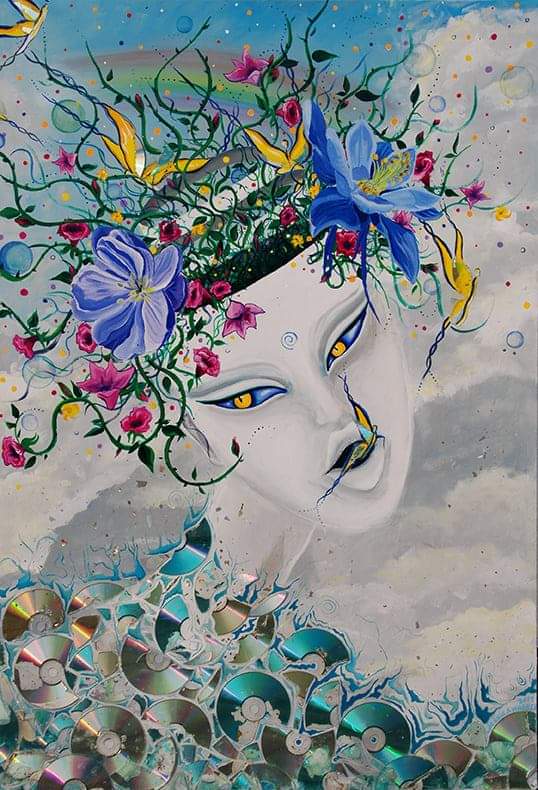
Artist: Jessica Warren. Like her work? Send her a token of your appreciation: https://www.paypal.com/paypalme/stu23
Pop Star
“There are two ways to build a pop star,” Gene began.
“Number One: The Disney Strategy. Find a child actress. Check the mom to confirm long-term viability. Put her on a show with a heavy laugh track, and get her to sing the theme song. Cue album release on Disney Radio, with heavy promotion to the Times to try to get Caramanica to note that she has “unexpected maturity” in her voice. Then quit the show, tee up the adult album, drop a TikTok sound for crossover appeal, put her in a crop top, and watch her go.
“Upside: Easy management; defined path; high ROI; target has immature prefrontal cortex. Downside: 73% likelihood of imploding at age 24.”
The crowd laughed. But they’d heard that joke before. He cleared his throat and moved down to stage right.
“Number Two: The Organic Strategy. Stalk TikTok and YouTube for singer-songwriters. Find a few and tell them they have potential with the right management. Pitch her best song to Krista over at Grey’s Anatomy and get it to go viral. Get her to film an indie video and then “shock the world” with a fully choreographed production number.
“Upside: Long-term viability, can demand more work hours because she’s not a minor.
Downside: Has mind of her own; may demand artistic control.”
This time, they laughed for real. He could feel it building, as he pivoted and crossed the front of the stage.
“As you can see, the options are limited. Building a pop star requires a heavy investment of time, money, and emotional energy.” He shook his head. “And what for? To have another young woman stop listening to your sage instructions? To lose millions of dollars investing in girls who will never make it? To end up fighting with your one star about whether she owns her own masters – masters that you, my friends, bought and paid for?”
Now they weren’t laughing. They were listening. He stood. Center stage, nearly glowing in the spotlight.
“Not anymore. We are ready for greatness, people, and our time is now. No longer will we be subjected to the whims of teenage girls and the risks of the so-called creative process.”
The stage went to black.
“Ladies and gentlemen, may I introduce the Britney 3.0.”
Lights up. Strobes on. And there she was; all 5 feet 6 inches of her, gyrating in a long-sleeved leotard and fishnets over a pumping bass beat.
The crowd lost it. But he had more to do. He breathed deep, and with a snap, brought her to stillness, hair tossed back and leg in an impossible kick. The spotlight was back on him and this was the moment.
“Designed in Los Angeles, with AI engineered by Tesla and a body engineered by the Pussycat Dolls, Britney 3.0 is the pop star of the future. She sings like Adele, dances like Lady Gaga, and walks a red carpet like JLo. She plays both the piano and the guitar, and can even pick up a bass if you’re going for a vintage thing. All you have to do is provide the inputs you want – pick a genre, a style, a bass line, and a handful of keywords – and the programming does the rest! She’ll perform at malls in Singapore and hawk jeans in Japan and Dance with the Stars and drop singles on demand, without ever needing sleep or rest or mental health days. And look at the returns. Instead of taking your measly 10% management cut, you’re entitled to all of the revenue, except for a modest licensing fee to us.”
“Best of all, no one will ever know the difference between Britney 3.0 and the real thing – except for you. Britney 3.0 offers the world’s most technologically advanced press capabilities, with 98% natural language compliance. Take a look!”
Britney 3.0 returned to life, pivoting and flipping her hair as she walked to Gene. “Hi Gene,” she said perkily, eyes bright and bashful at the same time. “I’m so pleased to be here! I love you, New York!”
The crowd exploded.
“Can I get a hug?” She reached out, all rosebud lips and innocence and sin in one synthetic package. His hands drifted down to scoop her rear in his hand. The crowd noise rose, and rose, as Gene grinned at the audience triumphantly.
And then, in the midst of the screams of the crowd, Britney 3.0 opened her mouth, cracked her jaw wide, and bit Gene’s head off.
June 2021 | Flash Lit Collective | Prompt #3
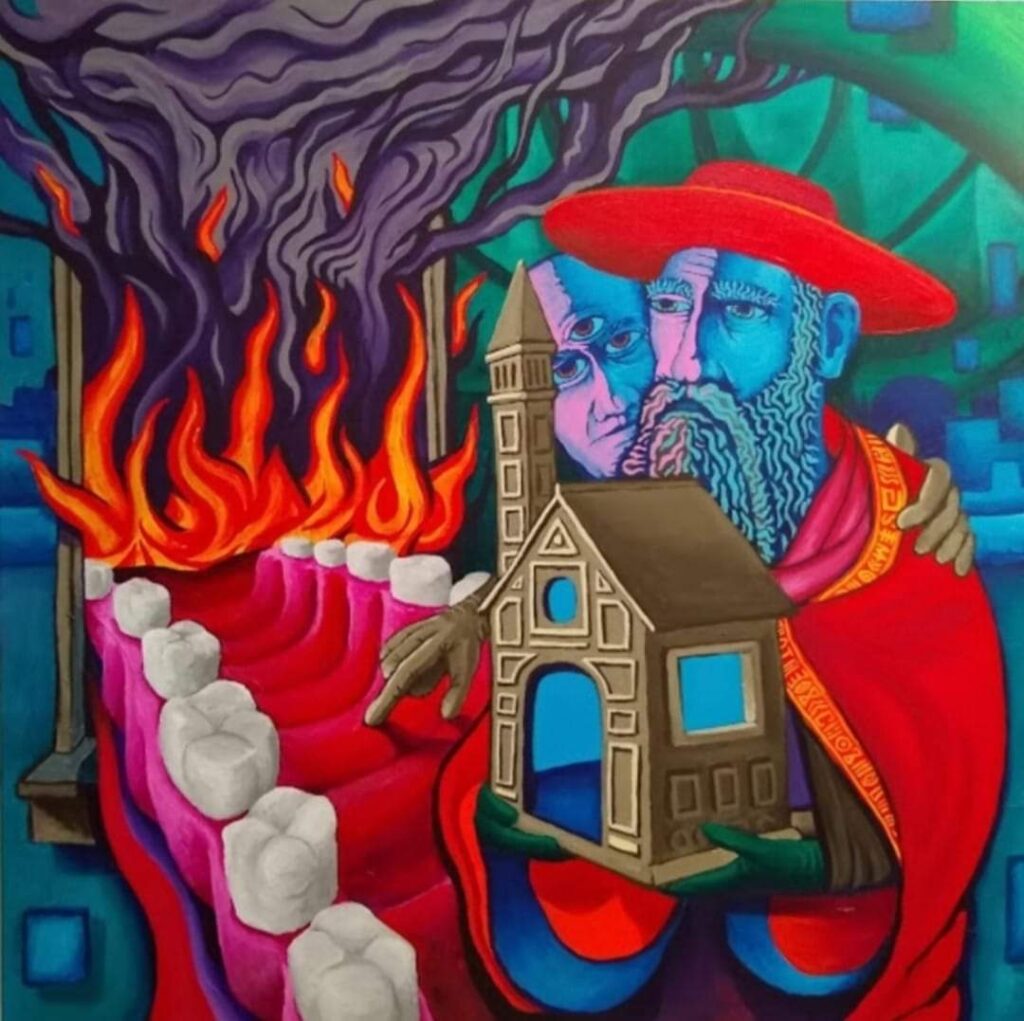
Artist: Wesley E Warren Like his work? Let him know: https://www.paypal.com/paypalme/stu23
Sacrifice
“Only you can make this right,” the demon crooned to Father Oleg. “It is such a small sacrifice, such a small thing to do.”
Father Oleg gripped the wooden church even tighter, his arthritic knuckles standing out in bright white relief against the liver spots of his skin. “But there are children inside this church. There are mothers. My mother was married in this church. My nieces and nephews are inside. They trust me! How could I do this to them?”
“Your god call to you,” said the demon, “and he demands a sacrifice. Did you think that this would be easy?”
“No,” Oleg said. “No, it has never been easy.”
“Nor should it be. The world cries out for redemption. You speak of babies and children in this building, but,” he hissed, “what of those babies weeping for their mothers? What of those mothers sobbing over broken bodies of their children? Do they not deserve to be beloved?”
“Of course, but my little Annika is in that church and she asks so little of me, only to be of help to me; how can I do this to her?”
“The world does not need Annika; it needs justice to roll down like rain, to drench the fires of cruelty. What is one Annika when compared with the needs of the world?”
“If only I could see the toll on the people, if only I knew what to do,” Father Oleg moaned. “They do not seem to be in pain?”
“Only because they do not see what I do. They cannot see the fires of their selfishness, their narcissism. They cannot see how their relentless pursuit of freedom has imperiled their children, has made them weak and craven. They are fools, deluding themselves that they are happy and fulfilled when they are empty shells, puppets for their own miserable self-interest. How can you let them suffer like this?”
The demon flung his arms wide, and the fires around Oleg surged brighter and hotter, the smoke thick and coated with a hazy purple mist. “Would you leave the world to this? Would you abandon the cause of righteousness and justice, would you let the people suffer in their decadence, for one Annika?”
Father Oleg let out a howl. “I know! I know what I must do but I cannot bear it.”
“You must!” screamed the demon! “The gods demand it!”
With a guttural roar, Father Oleg released the church and flung it into the void. The wooden building – so lovingly built, and painted every spring, cracked into a thousand pieces as it tumbled through the Path of Teeth and into the flames, exploding into sparks and thick, greasy purple haze. A sob wrenched through Oleg’s body. “I cannot live with myself!”
The demon smirked, he wrestled with his own facial expressions – and then he gave up, abandoning himself to a gut-wrenching laugh. Father Oleg looked at him, first in surprise and then in ever-increasing horror, as the demon finally recovered. “What’s so funny?” he asked, tears streaming down his cheeks. Gasping for breath between howls of laughter, the demons said, “Oleg, the funny thing is that you think you’re going to live.”
June 2021 | Flash Lit Collective | Prompt #4
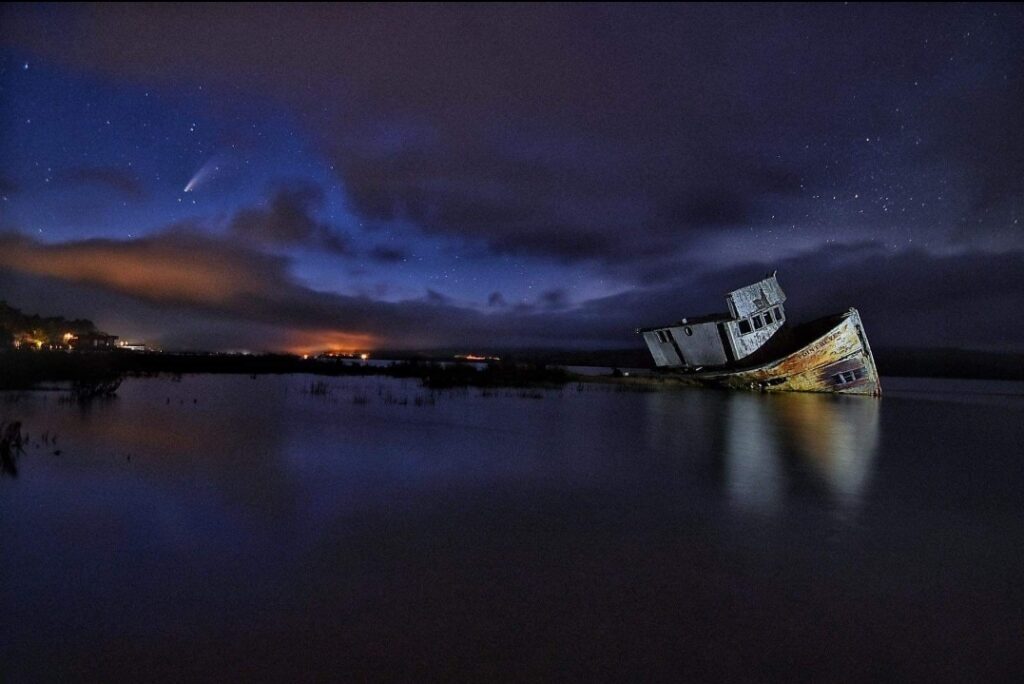
Photographer: Shannon Marsden. Like her work? Let her know: Venmo @Shannon-Marsden-1
Alden
John Gale Alden was one of eight children;
Eight children who played at the edge of Lake George;
Seven who piled into the flat-bottomed dinghy to sail the lake. .
Six who walked home from school, balancing on fence rails and jumping over mud puddles.
Five who built a fortress on the island in the creek and defended their territory from invaders.
Four who survived.
John Gale Alden married at nineteen.
Nineteen years to become a man.
Three years to love a woman.
One year to watch her wither.
Eternity to mourn her.
John Gale Alden witnessed twenty-three sailors leave Boston on the schooner Fame.
Twenty-three young men, breathing in smallpox.
Twenty-three bodies burning with fever.
Twenty-three souls turned overboard to the depths of the sea.
John Gale Alden boarded the Fame with two men at his side.
Three men to take the ghost ship home.
Three men against the sea.
John Gale Alden brought the Fame home.
He rerigged the sails.
He fought the waves.
He did not yield to the salt spray, turned to ice in the wind.
He did not run from the ghosts.
John Gale Alden became a ship builder.
He designed schooners that raced through the seas.
He designed yachts that won awards.
He designed boats that could survive at sea in any weather.
He designed boats that could always be sailed alone.
June 2021 | Flash Lit Collective | Prompt #6
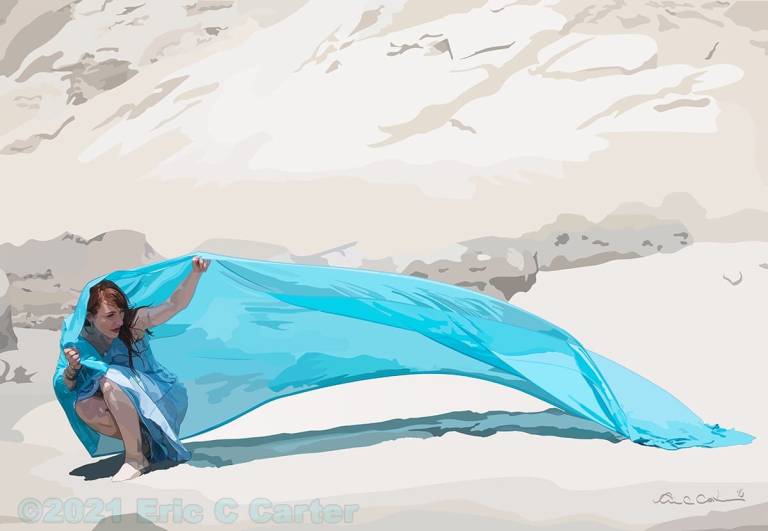
Image credit: Eric C Carter @dizzypixel. Photograph + illustration by hand; no filters. Like his work? Let him know: https://www.buymeacoffee.com/Dizzypixel
Joshua Tree
“I think she’s dead.”
The ranger radioed headquarters in a panic. “We are at The Cavern Of the Ancient, and there’s a woman just lying here. I don’t think she’s breathing, I need help now!” The woman – a girl, really – was thin as a rail, with ribs that jutted out underneath her shirt and expensive hiking shorts hanging low on her hips. She was lying on her side, her body curled into the meager shade that the crevasse in the rocks provided. Her eyes were closed. He closed his eyes too, just for a moment, and clutched the turquoise scarf in his hands and tried to sort out what had gotten him to this terrible moment in the desert.
The call had come over the radio that morning: German hikers with a satellite phone had seen a turquoise blue patch and sworn there was a woman there. At first, the rangers were skeptical. People often saw things in the desert; the heat played tricks on the eyes, and turquoise blue water was a frequent mirage.
But the Germans were adamant and their details were more specific than what the desert tourists usually provided. So they sent him out. “Hey Jim,” Clancy had called, “you’ve got another special job!”
Jim was new on the job, a rookie in the park that year, and was diligently coping with the obligatory barrage of Joshua Tree hazing. So far, he’d rescued an Instagram model wearing high heels from the top of Skull Rock (while she sobbed the entire time and promised him that she’d collab on whatever he wanted, while her boyfriend filmed the whole thing); given out 40 tubes of aloe for sunburns; and saved at least three hippies from getting lost in the desert while seeking their chi. It was not what he’d expected when he joined the Park Service.
So out he went again, to check out the turquoise mirage. He’d left the truck back at the turnoff and hiked out two miles to the rocks, then made a sharp jag into the canyon where the Germans had reported her. And then he saw it: a turquoise shimmer, flickering in the shade. It was real. He pulled out his radio and his first aid kit and started running. He reached the turquoise shimmer quickly. It was a huge scarf – made of silk, he thought, or something luxurious and raw. It had fallen gently over a mass that he realized quickly was the shape of a human. He gently picked it up, the scarf cascading around his hands and pooling at his feet.
She lay silently, gaunt in the shade of her turquoise shroud. He gasped and picked up his radio to call it in, yelling across the air and violating all protocol in hollering that he’d seen a dead woman. And then, just as headquarters picked up, he saw it – she breathed. And her eyes fluttered open.
“I thought you were dead,” he gasped.
“Not yet,” she whispered, her voice dry as the desert itself.


